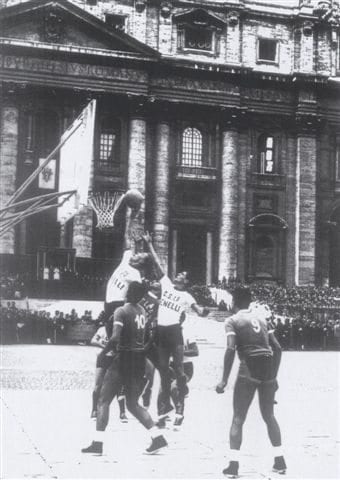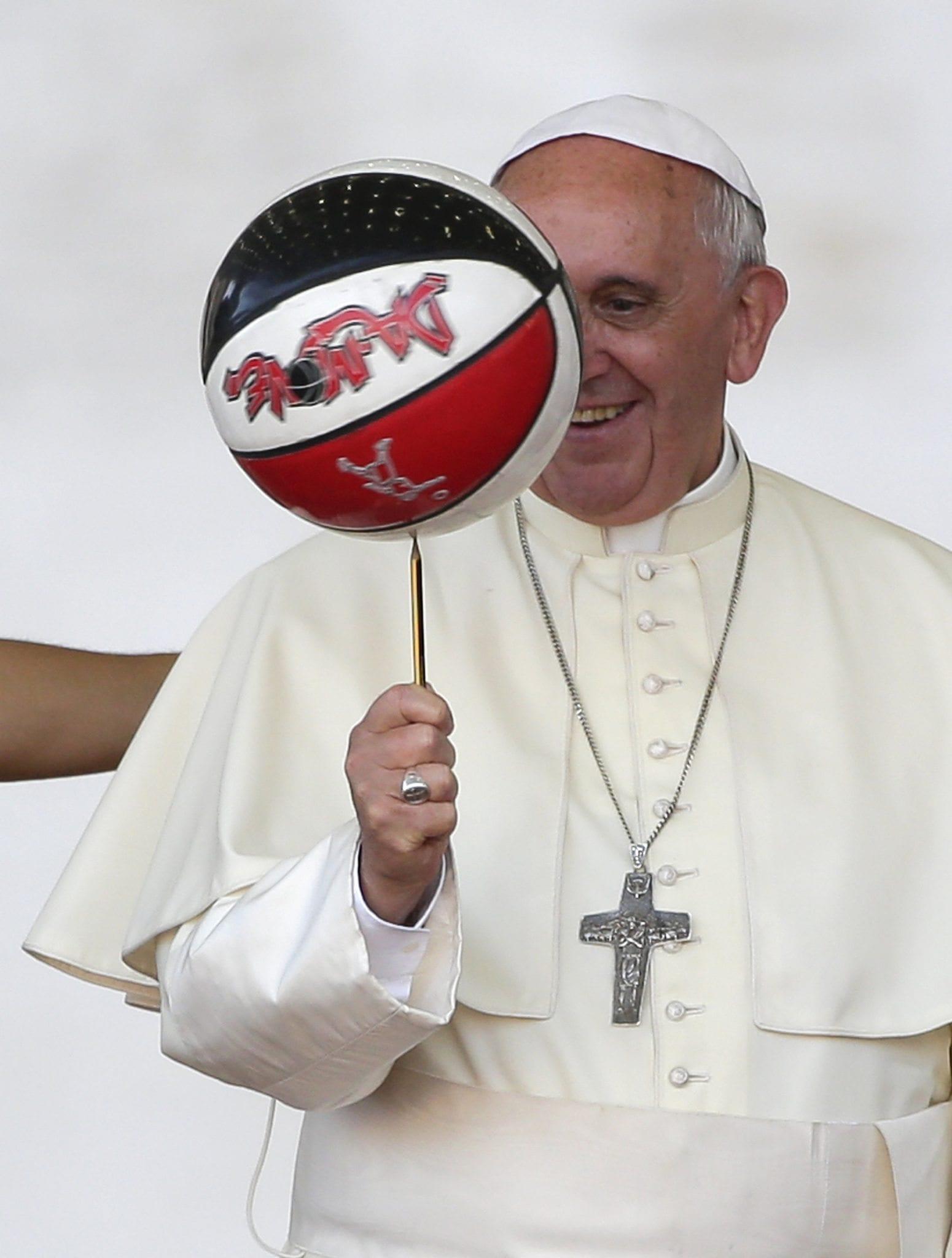ROME—What do Pope Francis, a Muslim soccer player, a Russian hockey legend, an environmental scientist, and the United Nations’ Secretary Ban Ki-moon have in common?
They all see sports, an activity shared by men and women of every nation, ethnic group, and religious belief, as a tool for peace. For this reason, they’re all taking part in a Vatican-organized conference called “Sport at the Service of Humanity,” which opened on Wednesday and is running until Friday, Oct. 7.
Addressing some of the world’s most important sporting personalities on Wednesday, Francis called upon representatives of sports and sponsors to maintain “the honesty of sports, of protecting it from the manipulations and commercial abuse.”
It would be sad, the pontiff continued, if people are unable to trust in sporting results.
“In sport, as in life, competing for the result is important, but playing well and fairly is even more important!” Francis, an avid soccer fan, said before thanking those present for their efforts to end corruption and manipulation of sports events.
The pope, together with 14 religious leaders from the three monotheistic religions- Judaism, Christianity and Islam- including personalities such as Justin Welby, Archbishop of Canterbury, and personal envoys from both the patriarch of Constantinople and Russia, joined forces with top-notch athletes, the Olympic Committee (IOC) and the United Nations.
“When people strive to create a society that is fairer and transparent, they collaborate with the work of God,” Francis said. This, he continued, also requires a commitment from different religious communities.
Explaining’s the Church’s involvement in the world of sport, he said she’s working in it to “bring the joy of the Gospel, the inclusive and unconditional love of God for all human beings.”
Talking to the leaders of other faiths who were attending, he said: “Our religious traditions share the commitment to ensure the respect for the dignity of every human being. So it is good to know that the world’s sporting institutions have taken so courageously to heart the value of inclusion.”
The conference “Sport at the Service of Humanity,” the first global conference on faith and sport, will take place at the Vatican’s Paul VI Hall, where the pope’s weekly audiences are held during winter time.
It’s organized by the Vatican’s Pontifical Council for Culture, headed by Italian Cardinal Gianfranco Ravasi, in partnership with Allianz. Coca-Cola, Alitalia, Giorgio Armani and other companies are among the sponsors.
“We need to return to when we used sports as a moral instrument,” Ravasi said at the presentation of the conference on Tuesday. “We need to go back to the ethics of sports because it’s both a moral and spiritual principle.”
The opening ceremony took place on Wednesday, and it included addresses from Francis, Ban and Thomas Bach, President of the IOC, and Welby.
The Anglican Archbishop of Canterbury said that sports has the power of bringing people together to compete as friends, respecting “one another even in opposition.”
Also taking part were South Sudanese runner Paulo Lokoro, who headed the Rio 2016 Refugee Team, Russian hockey legend Viacheslav Feishov and German Paralympic skier and pluri-gold medalist Anna Schaffelhuber.
Six in total, they represented the “six principles” of the conference: “Compassion, respect, love, enlightenment, balance and joy.”
During the event, Lokoro expressed his joy at having been invited both to the Olympics and to the Vatican, thanking Francis for giving him the opportunity to tell the world that “a refugee is a human being like other people. We can do things well, like other people.”
Rio 2016 was the first time the International Olympic Committee accepted a team of refugees. There are currently over 65.5 million people who’ve had to flee their countries because of violence, persecution or hunger.
“We’re refugees, but one day, at some point, we’ll go back [to the Olympics] representing our countries,” he said.
Monsignor Melchor Sanchez de Toca, who as an avid runner considers himself a sportsman too, said on Tuesday that the idea was to create the occasion for religious leaders, sports people, businesses and media to meet and talk to each other and to learn from each other.
“This won’t be an isolated event, because the idea is to create a global movement which involves everyone, regardless of their faith, culture or geography,” Sanchez de Toca said.
Ravasi added that the idea of bringing along professional, high level sportspeople and institutions into building the common good comes from the fact that for many, soccer stars are more influential than religious leaders.
The gathering’s program also includes environmental scientist Allen Hershkowitz, co-founder of the Green Sports Alliance, and who serves as the environmental advisor to many professional sports leagues in the U.S., such as Major League Baseball, the NBA and the National Hockey League.
He believes that this conference ranks among the most brilliant things Francis has done so far.
“Where is our cultural vision focused? There’s no question culture is important, but should it be focused on the divorce of Brad Pitt and Angelina Jolie, or should it be focused on the suffering of the majority of the world?” Hershkowitz told Crux on Tuesday.
According to the United Nations, nearly half the world’s population, 2.8 billion people, survive on less than $2 a day, and 1.2 billion people, live on less than $1 a day. Nearly 1 billion people are illiterate and 1 billion do not have safe water.
“Where should our cultural attention focus be?” Hershkowitz insisted. “The movie industry, the music industry, the sports industry, are they focused on humanity? No, but they should be.”
The 2008 summer Olympics in Beijing were followed by close to 4.5 billion people on TV. “That’s huge cultural attention. How do we capture it on behalf of empathy, to recognize the suffering of others?” he asked.
The environmental scientist believes Francis is heading a cultural shift, not only with his encyclical on creation Laudato Si, but also with this week’s conference.
A fan, he said, is a sports fanatic. The pontiff is trying to “tap into that fanaticism” and use it to fight climate change, domestic violence, racial bias, religious discrimination and gender inequality.
In sports, Hershkowitz argued, Africans, whites and Latinos play together, as do Catholics, Buddhists, Hindus and Muslims.
“That’s what sports can do, it brings people together,” he said. “If we can come together on a sports field, why not for social justice?”
Among the sportsmen participating in the conference, which is divided into a series of panels and workshops, is Kashif Mumtaz Siddiqi, an English-born Pakistani footballer.
“Sports diplomacy has a unique capacity to unite people and I really believe that a platform like ‘Sport at the Service of Humanity’ is a platform that is much needed today in this world especially to exchange dialogue and unite people from all different backgrounds,” Siddiqi said when presenting to the conference at the Vatican on Tuesday.
“Sport is our tool, peace is our goal,” the founder of Soccer for Peace said.
Talking about concrete ways in which the conference could help bring awareness of sports as a catalyst for peace, Siddiqi suggested a soccer match with people from all religions and cultures hosted in St. Peter’s Square.
Although rare, turning St. Peter’s into a sports venue wouldn’t be completely unprecedented: In 1955, a basketball game was played here, in the presence of Pope Pius XII.

In 2009, some 300 children took part in a volleyball rally and four years before, children had played soccer. On both occasions, the sporting events took place on a Wednesday, ahead of Pope Benedict XVI’s weekly audience.
Going even further back in time, to the 15th century, St. Peter’s Square was the scenery of a marathon “calico storico fiorentino,” the Florentine version of nearly rule-less soccer that looks more like rugby and wrestling combined.
After the opening ceremony, Francis and Welby shared a car to the Roman church of San Gregorio al Celio, where they prayed vespers together, commemorating the 50th anniversary of the first meeting since the Reformation of a pope and an archbishop of Canterbury.











